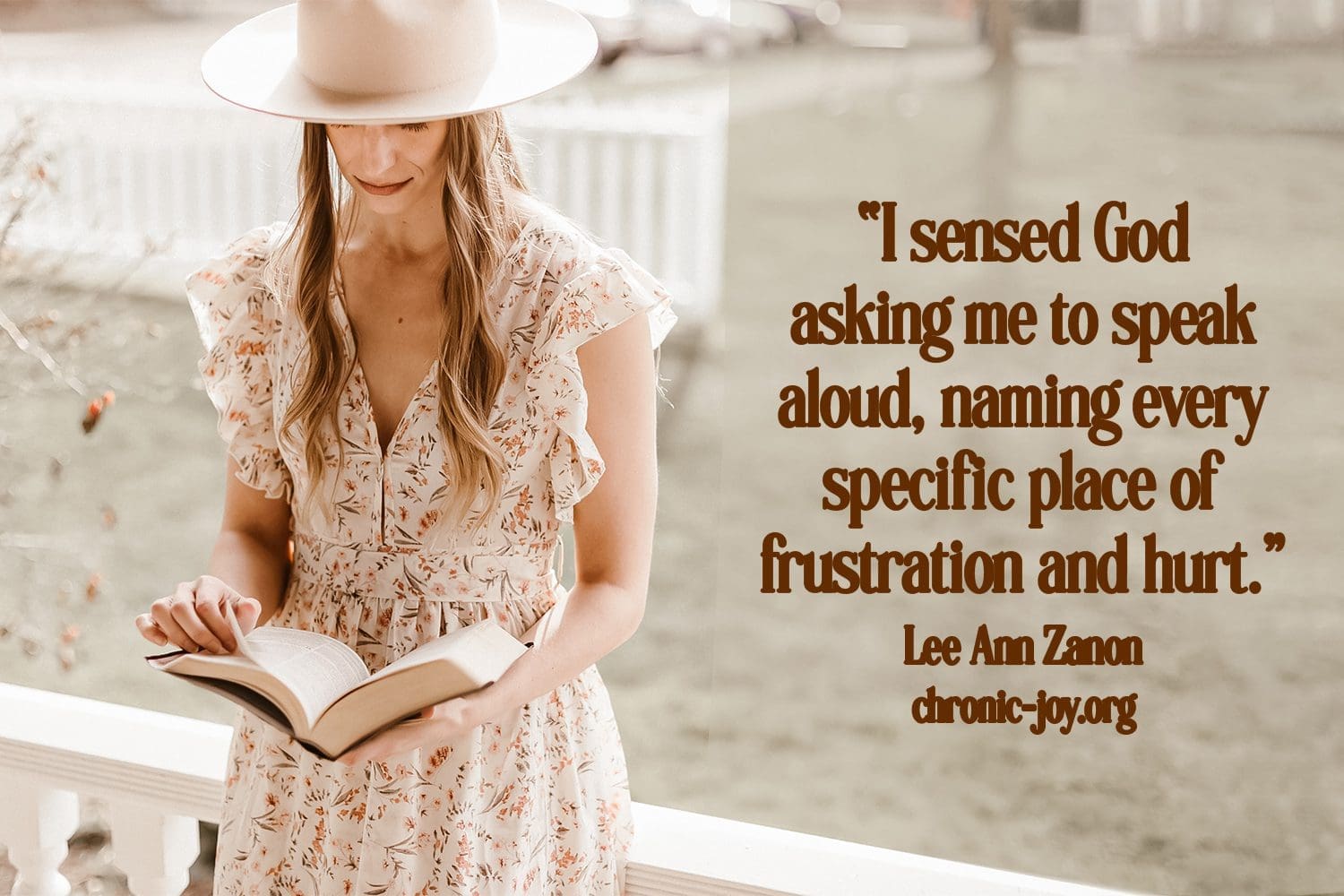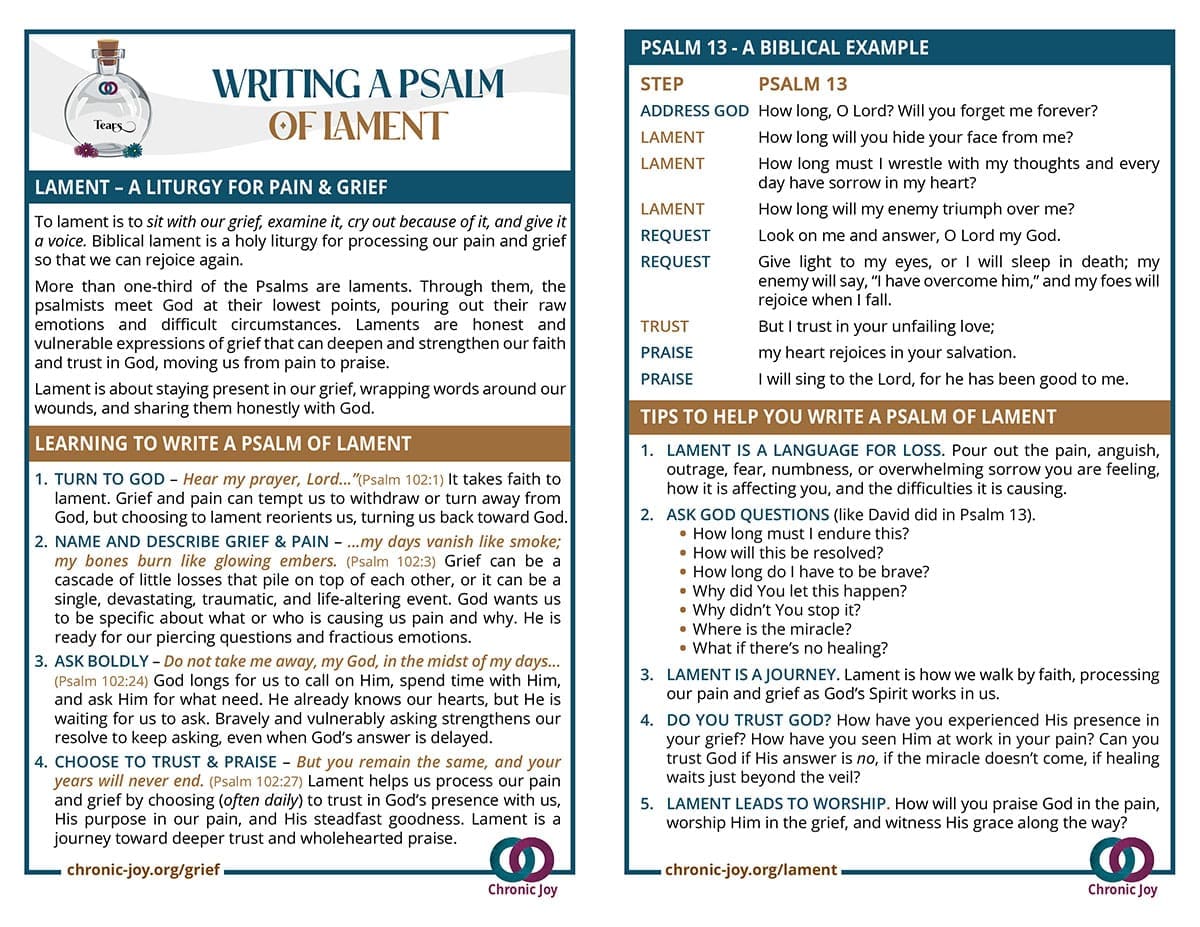
“I sensed God asking me to speak aloud, naming every specific place of frustration and hurt.” Lee Ann Zanon
FINDING A PATHWAY TO PEACE
Some seasons – weary places that stretch into weeks, months, and years – feel like they will never end. The question “How long?” haunts my mind, tempting me toward a pathway of despair.
The Lord offers a different choice, clearly portrayed in Psalm 13. There I find Biblical lament, a language I am learning to use to express my pain and find the way back to peace. I marvel at the author’s willingness to ask hard questions, giving voice to the angst I’m hesitant to admit:
How long, O Lord? Will You forget me forever? How long will You hide Your face from me? How long shall I take counsel in my soul, having sorrow in my heart all the day? (Psalm 13:1-2)
The next two verses reveal a desperate cry for help as the writer begs for divine intervention:
Consider and answer me, O Lord my God; enlighten my eyes or I will sleep the sleep of death, and my enemy will say, “I have overcome him,” and my adversaries will rejoice when I am shaken. (verses 3-4)
The Psalm concludes with a deliberate change of focus, shifting away from suffering toward God’s power and goodness.
But I have trusted in Your lovingkindness; my heart shall rejoice in Your salvation. I will sing to the Lord because He has dealt bountifully with me. (verses 5-6)
BIBLICAL LAMENT
Chronic Joy’s printable resource (Writing a Psalm of Lament) offers a verse-by-verse guide based on Psalm 13. It provides a compassionate journey of discovery through contemplation and writing with an invitation to read your words aloud.
Recently, God used principles from Psalm 13 to rescue me from spiraling sadness. After nearly four years, I was finally making progress toward long-term relief from chronic health struggles. Upon waking one morning, however, pain flared with raging fury. It seemed the endless treatments I’d endured had accomplished nothing.
At first, I tried to deny the ensuing emotional upheaval. I felt shame for the anger and fear welling inside me, but I wasn’t willing to face it. As the days passed, I started to feel numb. Motivation and ability to concentrate began to dissipate. A cloud of apathy descended upon my soul.
In His kindness, the Lord reminded me of His invitation to pour out my heart, as seen in Psalm 13. I had been trying to hide and knew I had to be honest. Usually, I pray by writing in a journal, but I sensed God asking me to speak aloud, naming every place of frustration and hurt.
I was humbled to acknowledge the depth of my anguish, battling the notion I should have been strong enough to handle it on my own. The feeling of relief that followed was tangible. A heavy weight had lifted. Physical pain remained, yet calm assurance prevailed. I began praising the Lord for His compassion and faithfulness. He would never fail or forsake me. He would see me through.
PRAYER
Heavenly Father, You see me. You understand the weariness of my body and soul like no one else can. I bring You every facet of my heart, trusting in Your promised help and care. I rest in Your strong arms of love. Amen.
QUESTIONS FOR REFLECTION
- How do you typically deal with difficult emotions?
- What keeps you from pouring out your heart to God?
- How does Psalm 13 speak to your situation?
AN INVITATION
I invite you to read and practice Chronic Joy’s printable resource Writing a Psalm of Lament. You may want to share it with others as well. As we release our suffering to the Lord, we’re free to receive His abiding peace. As the printable resource notes:
“Remember that lament takes time. Step in slowly. Sit with God. Allow yourself time and space to feel and experience your pain. When you’re ready … explore the precious and life-giving gift of lament.”


Lee Ann Zanon
Staff Writer
Lee Ann is passionate about spreading the truth of Scripture. For decades, she served in various women’s ministry roles (including teaching at Corban University for ten years) until chronic pain dramatically changed her life. Her background as a Bible teacher, retreat speaker, worship leader, editor, and writer has prepared her perfectly for her current focus on writing and providing one-on-one encouragement. She and her husband Mike have two adult daughters and five precious grandchildren who live just five minutes away—a gift beyond description! She is the author of Honest Hope.

Lament
Step in slowly. Sit with God. Allow yourself time and space to feel and experience your pain. When you’re ready, take up your pen and explore the precious and life-giving gift of lament.

Recent Comments